Yes, cats can eat bones.
However, only feed bones to your cat with caution to ensure that they are served safely.
There are health benefits associated with eating raw bones so they make a healthy addition to your cat’s food bowl.
Just be aware that bones can be part of your pet’s diet but should be offered in combination with other healthy items.
Contents
Eating Bones vs. Chewing on Bones
The first thing to understand is the distinction between eating a bone and simply chewing on the bone.
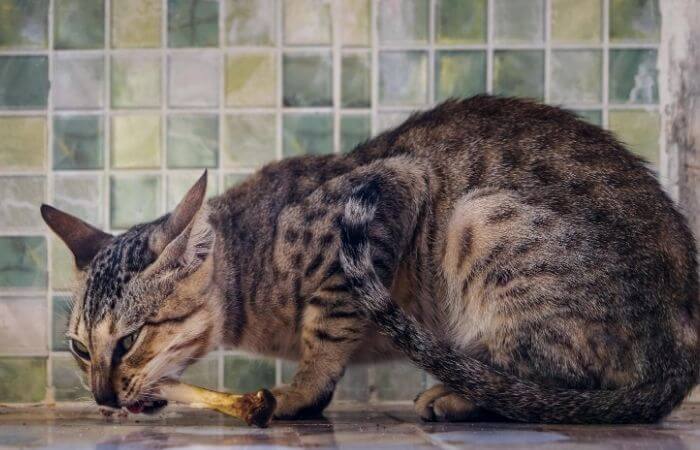
When your cat chews on a bone, they gradually break it down, chew it up into pieces like any other food to be swallowed and ingested.
On the other hand, eating a bone means that it’s likely in larger pieces and hasn’t been softened by chewing before swallowing.
Are Bones Healthy for Cats?
Allowing your cat a bone now and then is a healthy way to increase nutrient intake and gives your cat a good way to stimulate gums and teeth, helping keep them in good shape throughout its lifespan.
One of the main reasons why bones are healthy for cats is their protein content. Cats need protein to help them grow and develop and to promote healthy body functions.
Meat and its bones are a prime source of protein that suits your cat’s digestive abilities and taste preferences.
Bone marrow provides your cat with a plethora of iron, a nutrient that supports healthy red blood cells.
The bones themselves also provide your cat with much-needed calcium, a mineral that encourages healthy bones and cartilage, both for kittens and adult cats.
Offering your cat a bone from time to time also increases magnesium intake.
This nutrient works to keep the heart beating properly and aids in proper digestion and sleep habits.
A deficiency can lead to constipation so a bone makes a healthy choice if your cat needs a bit of help moving things along.
Meat is also a good source of certain B vitamins (especially B12), which play a role in your cat’s energy levels and can’t be found in non-meat sources.
You can feel good about letting your cat enjoy a bone for his or her quality of life and to keep him or her active and strong.
Also Read: Bone Broth For Cats: Top Meal Supplements, Benefits & More
What Kinds of Bones Can You Give Your Cat
You can’t simply hand your cat any bone and leave them to it.
You must offer bones with care so that your cat isn’t at risk of injury and can enjoy everything the bone has to offer.
Bones should be raw when served to your cat.
Cooked bones become more brittle and dry and can break or splinter, which can injure or choke your cat, causing minor pokes and scrapes or leading to something as serious as death.
Not all animal bones are appropriate for a cat’s diet. It’s best to choose chicken necks, wings or drumsticks or lamb shanks.
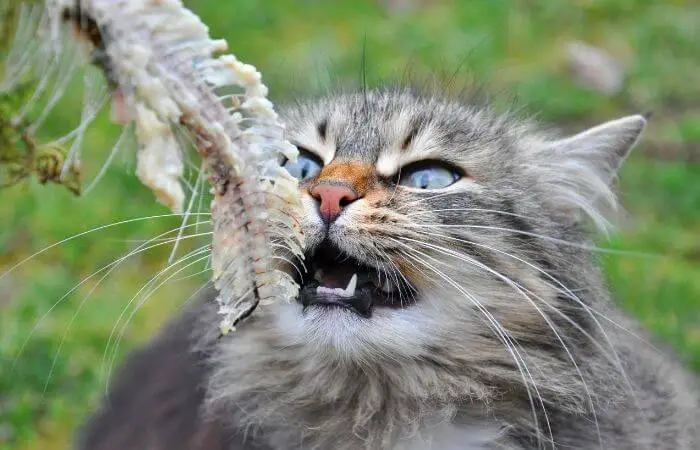
Tinned fish, such as sardines or salmon (though be careful with smoked salmon), are also safe as the bones are generally soft and small enough to be eaten without problems.
However, fish doesn’t offer all of the nutrients your cat needs so be sure to serve it alongside other items to fulfill your cat’s complete nutrition needs.
Anytime you give your cat a raw bone, either to chew on or to eat, it’s vital to supervise.
Never leave your cat unattended with a bone.
This ensures that you can take it away if it breaks or splinters and you’ll be nearby to help your feline friend if something does happen.
The Dangers of Giving Cats Bones
While raw bones can be a healthy source of many nutrients and a fun way to give your cat a treat they enjoy, there are some things to consider.
Understanding the potential dangers of giving your pet a raw bone can help you weigh the pros and cons so you can decide what’s best for your beloved cat.
As mentioned above, bones do pose a choking hazard to cats.
Make sure the bone isn’t too small or too large to reduce the risk that it will get stuck in your cat’s airway.
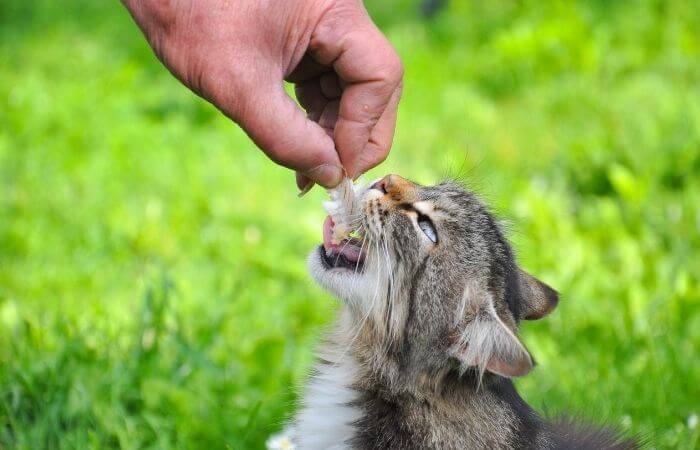
Never give cooked bones or a bone that is obviously broken.
Because most experts recommend only giving cats raw bones, you should also be aware of the risks of doing so, from a health standpoint.
Raw meat, including the bones, can sometimes harbor harmful bacteria or parasites that can make your cat sick.
Symptoms may be mild, but if they become severe, they can lead to dehydration and even death.
Ask a Vet
If your cat has eaten a bone and is showing signs of discomfort or isn’t eating or drinking then we recommend you speak with a vet ASAP to help you work out what’s going on and what needs to be done. JustAnswer allows you to talk in real-time to veterinary experts for a small fee.
Conclusion
Yes, you can offer your cat a raw bone from time to time.
The trick is to be vigilant and make sure they enjoy it in a safe way. Of course, there’s no rule that says you have to feed your cat bones.
If the idea makes you uncomfortable, consider offering cat food that provides the same nutritional benefits and may contain bone pieces.
As an Amazon Associate I may earn a small fee from qualifying purchases at no extra cost to you. This helps us run the site, so thanks for your support!

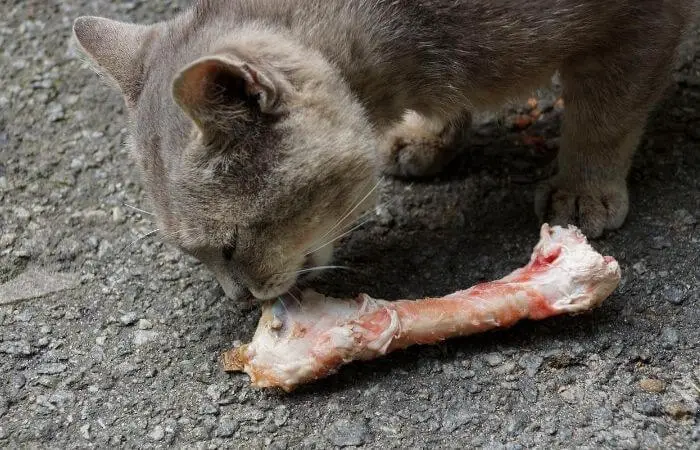

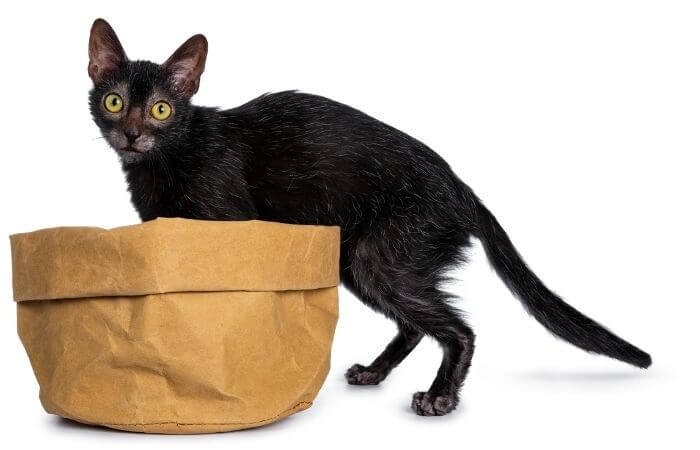

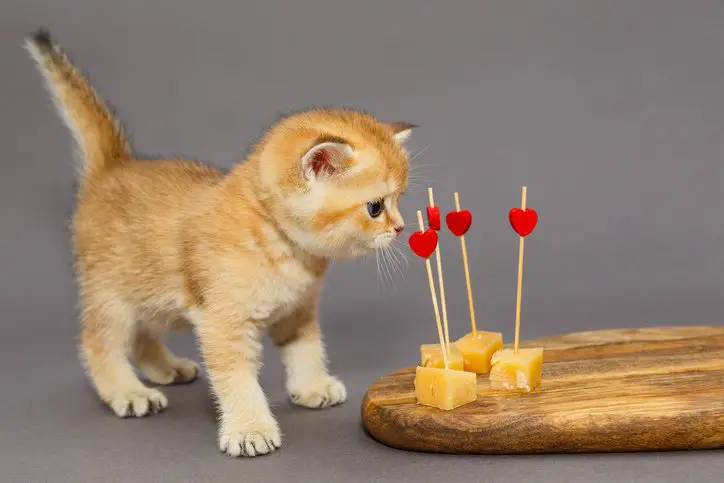


Leave a Comment